"A Life with Art and Politics"
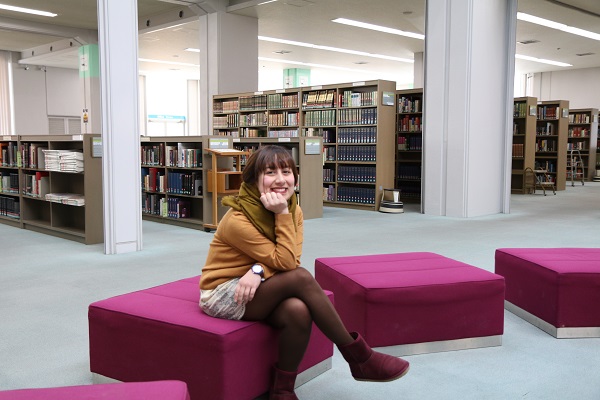
Name: Pinar Temocin
Home Country/Region: Turkey
Affiliation: TAOYAKA Program for Creating a Flexible, Enduring, Peaceful Society (5-year integrated PhD program)
Hobbies: Poetry, cinema, languages, nature-based activities
(Date of Interview: Mar. 8, 2017)
First of all, tell us about your hometown.
I’m from Adana, which is located in the south of Turkey. It is famous because of the historical towns around it, the food such as kebab, and the weather. I would say that it is the hottest city in Turkey. We actually have lots of Syrian refugees, because it’s in the Mediterranean part and close to the Middle East, so you can find many people speaking Arabic and Turkish there. Other than that, many people from the East go to Adana to work in industries or cotton farms.
Because of its historical background, it inspires many people. My hometown has many famous artists such as Yaşar Kemal – he was a famous writer, a candidate for the Nobel Prize in Literature and the symbol of our city. We also have Yılmaz Güney, a film director who won the Palme d'Or at the Cannes Film Festival.
Because of the artistic atmosphere and romantic history, many people visit your country and hometown area.
Exactly. But especially since last year, as reported in the media, our country is a bit chaotic in terms of politics. It’s sad, and especially when you are abroad you are more conscious about your country. When I read the news I become extremely worried about my country and its future. But still, I would say that it is a cool country, with its uniqueness, history, art… it has everything!
Before coming to Japan, you gained a lot of experience in multiple regions around the world, right?
That’s right. When I was studying philosophy in Izmir, another Turkish city on the Aegean Sea, I decided to do an exchange program in Germany because German philosophy is very important. So I went to Germany for one year and then I did a couple of internships abroad, like in Prague, on international relations. Also I worked for children in Saint Petersburg, and then I carried out projects on history in France. When I decided to do my Masters in political science, I went to the south of France, Montpellier, which turned out quite good. I studied political science, comparative politics and public policy in France. And now I am here to study on related issues.
It looks like you are always on the move.
Exactly. I like to travel. Travel is my passion. I want to write a book, a novel in the future, so that’s why I keep traveling. And it’s not like sightseeing – I don’t like to be a ‘tourist’, I go and I talk to people, to learn more about the culture, background, and politics. And also whenever and wherever I go, I work voluntarily. For example in Morocco, I was writing my PhD proposal but I was also volunteering at the same time. It was tough, but I learnt the situation there. That’s why when traveling, I always combine everything, like learning, volunteering, doing something for society, and also learning something from society like the political issues there. It’s a good experience and I will continue doing it.

I’m always on the move, yes, because I believe that I should do something because I’m energetic, I’m young and I’m capable! Every morning I’m always thinking ‘What to do today’ and do my scheduling. I write my plans for today, next week, next month, next year… everything is planned.
Your life is full of adventure.
Well, that’s not easy. It’s difficult but enlightening, enriching, and I learn a lot. I mean, instead of reading my book at home, I prefer going out and getting experience. This gives me the opportunity to meet people and listen to their stories, so it is a good way for me and I really enjoy it. First of all, I will need a good passport and a visa to travel somewhere else. Then I try to look for good options and find voluntary work before going to look at the political aspects of the country. And I travel solo. In the past, in Europe, I travelled with my friends, but when I go to other continents I prefer going there alone because it’s better for me to interact with local people and have a good conversation, face-to-face conversation with them.
It was about six months ago when you first came to Hiroshima University, wasn’t it?
Yeah. At the opening ceremony of the Taoyaka Program (*), I felt so privileged because I was the only newcomer (laughter). Normally this program accepts a number of students at one time, but I was the only one then. And I didn’t understand the ceremony, there were so many Japanese people around me, the senseis – I got nervous but it was a wonderful experience. I enjoyed it! (laughter)
(*) TAOYAKA Program for Creating a Flexible, Enduring, Peaceful Society. As for details, please refer to the website: http://taoyaka.hiroshima-u.ac.jp/english/
Why did you choose Hiroshima University?
I applied for this university because I am working on nuclear related issues, anti-nuclear activism. I was told that I should either study in Hiroshima or Nagasaki, but there was no university in Nagasaki that matched my conditions, so Hiroshima was the only option for me. I had other opportunities to study in France or America etc., but I said no, I need to go to Hiroshima!
When I came here I thought it was great. With Hiroshima University, I like the campus life first of all, I really enjoy being in the campus even during holidays. It’s a cool university. Especially teachers, the senseis are encouraging and they are great at their research, and I really learn a lot from them. Maybe I need to improve my Japanese and become more active in student clubs such as anime or manga club, theatre club, or cinema club, and learn more about Japanese culture.
And now you are studying Japanese. How is it going?
I am taking Japanese lessons provided by the Taoyaka Program. I have a lovely Japanese sensei. It’s very difficult for me because although I speak a couple of different languages, I’m not used to Japanese letters. So I’m actually learning Japanese through romaji (Roman alphabet). But I will learn katakana next, I promise myself! (laughter)
Could you tell us a bit about your current major?
I’m studying at IDEC (Graduate School for International Development and Cooperation), but I’m majoring in Peace and Co-existence under my sensei who is an expert on nuclear energy, their weapons, and also peace. Actually in France I worked on anti-nuclear activism, but here in Japan I’m framing my topic to work on state weakness in answering or meeting the demands of the public in terms of nuclear weapons. So that’s why I came to Hiroshima, to work on nuclear issues.
Were you educated on peace at school when you were a child?
No. I don’t know about the current system, but when I was a kid, we didn’t have anything like ‘peace education’ class. I think Japan is special among other nations, because peace is important in Hiroshima and Nagasaki and maybe in Japan because of its history.
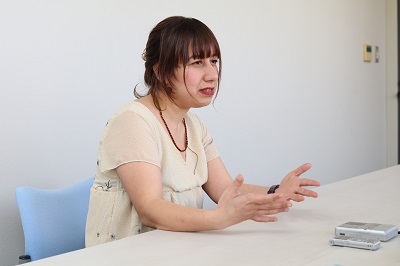
But in my country, ‘peace’ has different meanings. For example, when we mention peace, you can say that peace is ‘the absence of war’. ‘Peace’ in Hiroshima often means non-nuclearisation, but for most people in my country lately, it means living peacefully without any terrorist attacks. For me, peace is about development, about wealthiness of nations, non-nuclearisation as an anti-nuclear activist, but in Turkey, peace is about living together, and I don’t talk about nuclear issues in my country. So I don’t know about the peace education in my country, but if we had good peace education it could be different from Japan or anywhere else because of different perspectives. You can define peace in different ways.
I see. I’ve heard you already had the opportunity to talk with atomic bomb survivors.
Yeah, I met two hibakusha (atomic bomb survivors). Their stories are very saddening, because they weren’t political actors in decision making. They were just civilians on the street, and they suffered, just because of political reasons. I was very sad when I was listening to their stories, and because of my research I read their testimonies, and I still feel goosebumps, I feel sad. But I really appreciate how they make their story heard by people like me. I came to Japan to work on that issue because I heard a lot about their stories in Turkey. I am grateful that they shared their own ones with me.
And your program includes several on-sites trips. Have you experienced some of these?
So far, I experienced two on-site visits both of which were held in Japan. Next time, we are going to Nepal. It’s my first on-site visit abroad and I’m very excited about that. It’s a project in Nepal but in fields outside my specialty, so I am a bit concerned about the different terminology. But I like on-site visits because we are not only working on the theoretical aspect of the issues, we also go and practice, we see with our own eyes. It’s a good experience. But sometimes technical issues are a bit difficult for me to understand perfectly – I’m reading about Nepal right now in order to make use of this opportunity more effectively.
I hope your on-site visit to Nepal will be successful. By the way, how do you spend your free time?
Well, one of my hobbies is cinema. I wrote my bachelor thesis on existentialist cinema. Actually my friends in Tokyo and I are now in the process of a project, I will go to Tokyo to appear in a short movie. I like the films of (Akira) Kurosawa. He is fantastic! I admire him because he shows Japanese culture, and I like his way of explaining the relation between humans and nature. I also like Hayao Miyazaki, the animation director. He is great too, showing us Japanese culture. I’m not a good anime watcher, but Miyazaki is a genius, I think. He is inspiring!
And I have good friends, Japanese classmates. They help me to learn more about the different sides of Japan. I actually have a kind of host family, my friend’s host family officially, but they also invite me to spend time with them. I always try to enjoy my stay in Saijo and get benefits from each option.
How about your cultural experiences in Japan? Have you tried sake in Saijo?
I’m a beer person, but yeah, I drink sake too. I drank my first sake at the Sake Festival in Saijo, and that was my first weekend in Japan. I also like umeshu, plum wine. My host family gave me a bottle of their homemade umeshu, the taste was wondrous!
Wow, that's great! Anything else?
Actually I’m looking for a Go club to learn how to play. Because I’m so active, I need my brain to be relaxed, and I want to learn it. I’m interested in Ukiyo-e paintings too – I want to learn, not how to draw, but the techniques and the essence of this art, like the nature and flowers. It’s very detailed art, so exquisite. I actually bought origami papers consisting of Hokusai paintings and put them on the wall of my room, because it’s so relaxing. The colors, the details… I enjoy it.
I also like spending time in nature, in forests. For example, I will go to Shikoku – even though I’m not a religious person, I want to explore the pilgrimage route there. And I will do organic farming there voluntarily; a Japanese family will host me. I will be in nature, I bought a camera, and I’m going to shoot pictures of natural scenes, because Shikoku is a very good place for nature. But of course, I don’t want to just go and take pictures and come back to Hiroshima and put them on Facebook. I want to learn, to enjoy small towns like Tomonoura and Naoshima, where I can see local cultures.
Pinar san, do you have any advice you’d like to give to younger students?
Good question. I would just like to advise them to be enthusiastic in learning. I think we should definitely be skeptical of everything, we should always be open to learn, to ask ‘why is it why it is’ – to think more, to question more. Hobbies are also really important. You should be passionate about your hobbies and not let it be just a short-term enthusiasm. And I suggest that they be active in society, like doing some volunteer work.
And also, be open to cultures. I find that in Japanese society, even though you are actually open, you refrain from opening up to people, maybe because of the society. I think they [Japanese people] should be more open to people, new lifestyles, different perspectives, different cultures, different ways of living.

And for Japanese people who are struggling to study English, I wouldn’t say to go abroad because it’s not easy to go to another country just to practice the language. What I can recommend is to listen and have a vocabulary list. I still have a vocabulary list in my bag, and I write down the words that I don’t know in English and then I check it later in the dictionary. I’m still learning English too. It takes a lot of time, but I learn and I enjoy it. Don’t be shy to ask questions. Still I’m asking my American friends to correct my mistakes! By this way I can learn.
Can you tell us about your dream?
Oh, I don’t have a dream, but I have future goals. First of all, I want to write a good thesis. I want to publish some articles. And I want to enter the academic world in English speaking countries, to improve my English (laughter). And yeah, I want to write a book. And I want to have a life with art and politics.
So you plan on entering politics in the future?
No, I’ve never thought of becoming a politician. Some people ask me the same question, actually, but no! I don’t think I’m the right person to be a politician. I’m good at criticizing politicians though. (laughter)
Pinar san, thank you very much for your time today.
Thank you, I appreciate your time.
Photo Gallery
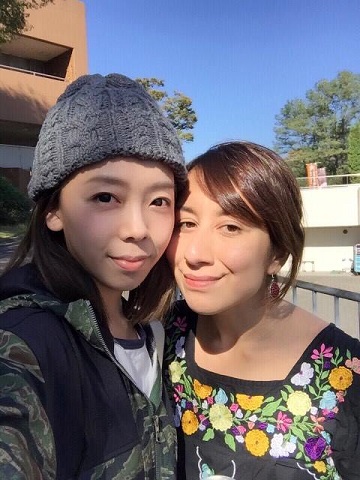
Daphne and I - in the campus
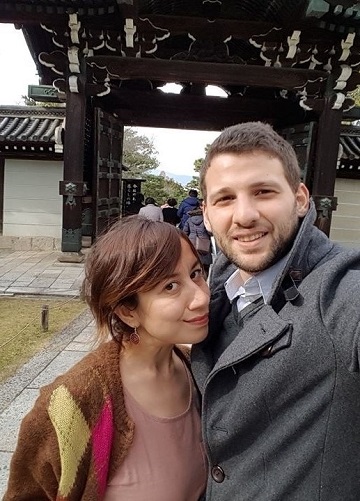
Mohammad and I - in Kyoto
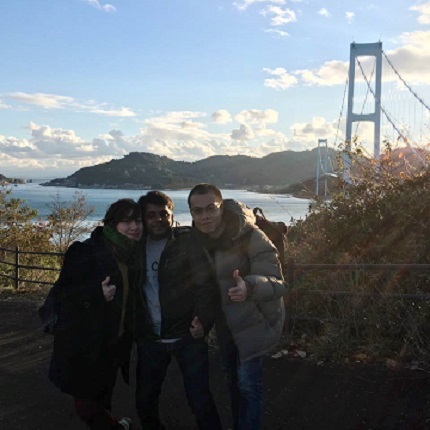
At Kure with the Taoyaka students (Gajender and Quan)
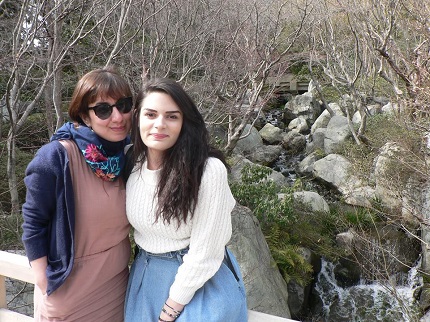
Helena and I - in the park in Higashihiroshima
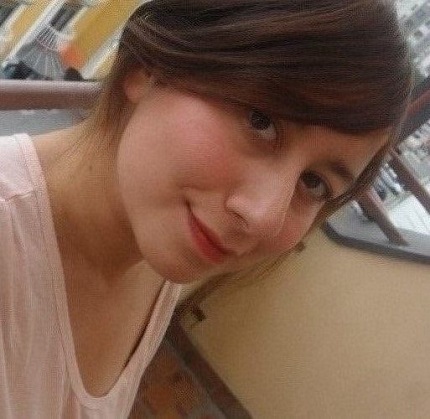
Me in Serbia


 Home
Home